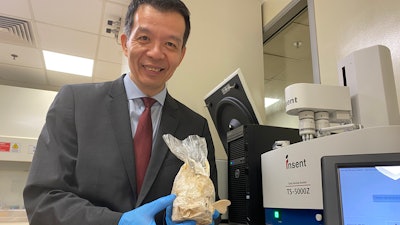
Scientists from Nanyang Technological University, Singapore, have developed a technique to cultivate a fungi-based food product that could serve as a healthier, better tasting and greener alternative to plant-based protein.
The fungi used to cultivate the product is grown from a base of nutrient-rich common food waste, which infuses the fungi with more essential nutrients, such as protein, iron and amino acids. This makes them more nutritious than ingredients commonly used in plant-based alternative meat, such as peas, chickpeas, wheat gluten and soy.
The cultivation of the NTU-developed food product would also offer an opportunity to reuse common food waste and byproducts of agriculture and the food and beverage industry, such as soybean skin, wheat stalk and brewers’ spent grain, a byproduct of the beer-making industry.
It is estimated that globally, around 39 million tons of spent grains and 14 million tons of soybean skin, also known as okara, are thrown into landfills yearly, where they would decompose and add to greenhouse gas emissions.
The study, which presents an innovation that could help cut down on waste, reflects NTU's commitment to mitigate our impact on the environment, which is one of four humanity’s grand challenges that the university seeks to address through its NTU 2025 strategic plan.
Professor William Chen, Director of NTU’s Food Science and Technology program, led the development of the food product.
“Our fungi-based food product is yet another triumph for NTU, as we look to find successful ways to find new uses for products that would otherwise be left to waste," Chen said. "Upcycling these products to cultivate fungi, a food source familiar to Asian consumers, is an opportunity for enhancing processing efficiency in the food supply chain, as well as potentially promoting a healthier non-animal protein alternative to enrich diets.”
To scale-up their fungi-cultivation method, the NTU team, which also includes PhD student Malsha Samarasiri at NTU’s FST program, is collaborating with The FOODBOWL, part of New Zealand Food Innovation Network, a national network of open access food processing facilities supported by the New Zealand government to help food businesses and startups globally innovate, scale up and commercialize new products — ultimately to international scale.
"We are excited to be able to support global innovation here at The FOODBOWL to develop more nutrient rich alternative proteins by utilizing local waste streams," said FOODBOWL chief executive Grant Verry. "New Zealand and Singapore already have strong collaborative agreements in place and this project is another great example of the value such relationships can deliver for both country’s economies and overall food systems, with industry lead and government enabled innovation for the food sector.”
One New Zealand startup that is collaborating with NTU’s FST program to implement the fungi cultivation technology in its food products is Off-piste Provisions, a plant-based meat company.
“We are looking to team up with leading food scientists, such as NTU’s Professor William Chen, to help solve the problem that alternative protein startups like us face – mimicking the taste, texture and protein hit of animal products," said Off-Piste CEO Jade Gray. "We are confident that through collaborating with NTU’s Professor Chen, we can craft a range of fungi-based meat products right here in New Zealand that will entice the most hardcore of carnivores, tick all the health-conscious boxes and provide the protein required for your daily adventure.”
Easing mainstream consumers' adoption of plant-based meat
Startups in the Asia Pacific region that develop plant-based proteins received $220 million in funding in 2021, of which a large percentage went into research and development to boost the texture and taste of their products to resemble that of meat, as research has found that those two factors would help mainstream consumer acceptance of plant-based proteins.
The NTU-developed food product, which is based off the edible white mushroom (Agaricus bisporus), would also address several critiques of plant-based protein, which often need flavoring to be added to taste good, are highly processed, and can lack some essential nutrients, such as iron and amino acids.
The fungi-based food product could stand to be more easily accepted by consumers, as it already resembles meat more than other plant-based proteins, shredding like how cooked chicken would.
It also tastes more like meat as it contains higher levels of amino acids, glutamic and aspartic acids, compounds that commonly occur in animals, which give their flesh that trademark "meaty" flavor.
“We are motivated by our close ties with the industry to translate our findings into solutions for pressure points for today’s food & beverage producers, such as improving the flavor, nutrition and sustainability profiles of their products," Chen said. "Nature, in the form of fungi, is a powerful tool to help corporations not only cut down on waste but potentially improve human diets, but they require research and innovation, which we are glad to provide, to bridge that gap.”
Besides playing an advisory role to startups, the researchers at NTU’s FST program hope to develop their product to further boost its nutritional profile, as well as reduce food waste. They also hope to commercialize their solution by 2024.






















